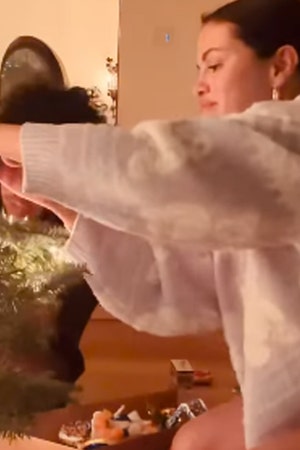 YouTube
YouTube
He discovered the long-rumored lockbox hidden under the attic floorboards.
A Massachusetts family fable about their grandfather's buried treasure has turned out to be true.
Professional treasure hunter Keith Wille was hired by the clan to do one final sweep of their home before they sold it — and he struck gold.
Documenting his exciting find on his YouTube channel, Wille explained that the family had long suspected their pharmacist granddad had squirreled away a stack of cash somewhere in the home, but they'd never been able to find it.
 Facebook
Facebook
Woman Discovers 'Creepy' Light Shining Out Of Her Hotel Bathtub Drain -- But What Is It?
View StoryThey suspected it was in the attic; as the rumor went, it was in a spot that if you shone a light from underneath, you would be able to see it from a crack above. But despite many searches — even hiring a construction contractor to haul up floorboards — they were fruitless.
Enter Wille.
In his video, he assesses the scene, and introduces his crucial tools, including a XP Deus metal detector and 8.5-millimeter endoscope camera.
Scanning the floor, he marked every significant beep with a crayon, intending to return to each spot with a drill to drop his camera into — but mainly ignoring the spots with recently moved floorboards, guessing they had already been searched.
"As I approached an hour of searching with my XP Deus metal detector, I had already heard many signals and seen even more evidence of other people removing floorboards," he recalled on his blog. "But I hadn't heard any signals I felt were worth stopping and conducting an immediate investigation, mostly because of the fresh claw marks in the wood above almost every signal heard."
"I decided to inspect outside the rumored area and get closer to the attic space's sloped ceiling."
It was at this point he noticed a spot right up against the roof bearing saw cuts that looked like they had been made with an older-style saw, by someone inexperienced in woodwork; they also bore two parallel splits he recognized as typical of wood forcibly removed — possibly with a prybar.
"Splits like this would not have been done during the installation of the floor seventy years ago," he said. "My conclusion – this looked like the work of a homeowner hurriedly removing boards and warranted a closer inspection."
 Warner Bros./TikTok
Warner Bros./TikTok
Woman Who Found Secret Entrance to Neighboring Apartment Gives Surprising Update to Ellen
View StoryThe video blog shows the exciting moment the camera broadcasts an image back to his iPhone of a shiny circle bearing letters and numbers. "OH MAN, THIS IS A KEYHOLE! I yelled."
After painstakingly removing the impeding floorboards, he finally brings up the lockbox — noting that there was no way light could have shone up past it, and that the grandfather had clearly added more wooden blocks and moved insulation over it to make redundant that particular part of the legend.
Although they had no key, the lock box had a simple piano hinge that could be punched out with the correct tool and removed, freeing the treasure after 63 years.
Inside he found stacks of uncirculated cash, including several $5,000 bricks of crisp bank notes.
The total face value was $46,000; but as Wille noted, many of the notes were likely worth far more than their face value, as they were "silver certificates" — highly prized by collectors.
"The highly collectible silver certificates are banknotes representing a stated amount of silver bullion payable to the bearer on demand," he explained. "Silver was viewed as a type of insurance, just in case the dollar value suddenly dropped."
And while $46k is obviously a lot of money today, it was worth almost ten times as much to the grandfather the day he buried it in 1958, with an inflation-adjusted equivalent of $421,603.
Speculating as to why he hid the cash, Wille claimed money — and indeed all material possession — meant something different to the children of the Great Depression.
He said the same house also had antique tins of flour and boxes of nails from the original 1950s construction hidden there.
"To most, it might seem strange to save nails and baking flour when you can afford to hide a stockpile of cash," he said. "Unless you grew up during The Great Depression, (they) were survivors and clung to every material in their possession."
 TikTok
TikTok



















